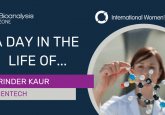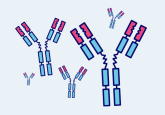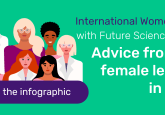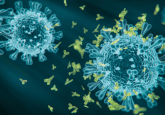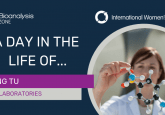AAPS PharmSci360 conference highlights 2023
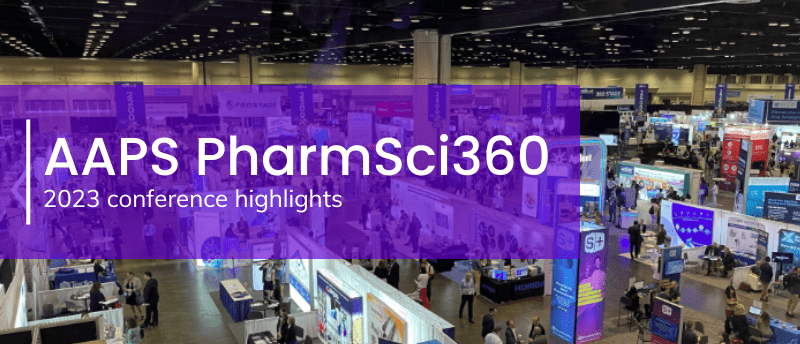
The American Association of Pharmaceutical Scientists (AAPS) PharmSci360 2023 conference (October 22–25), Orange County Convention Center (FL, USA).
Bringing together ~4000 scientists, delegates and students, AAPS PharmSci360 followed six subject tracks including bioanalysis, career development, discovery and basic research, formulation and delivery, manufacturing and analytical characterization and pre-clinical and translational sciences.
Highlights from the session
Patient centricity: one blood draw at a time
Speaker: Enaksha Wickremsinhe, Bill and Melinda Gates Medical Research Institute (MA, USA)
Moderator: Catherine Brockus, Eli Lilly and Company (IN, USA)
Enaksha opened the discussion by emphasizing a shocking statistic: less than 10% of a blood sample is typically used during testing, whether that be for clinical trials, therapeutic drug monitoring or disease condition monitoring. For such an essential process, why are we so wasteful with sampling and why are we making patients and clinical trial participants endure sub-optimal care, which is inconvenient and painful for many? Another startling fact highlighted that ~30% of participants drop out of clinical trials and the most common reason for dropout is inconvenience, followed by financial costs through missed work and travel challenges. Considering that the cost of recruitment is estimated at 7 billion USD and replacing clinical participants midway through a trial can cost ~$20,000, there is a compelling financial incentive to making blood collection easier and more accessible to all.
Although we have seen advancements in analytical technologies through improved sensitivity and throughput and lower sample volumes, blood sampling procedures have remained largely unchanged since the introduction of vacutainers in 1947. Enaksha urged that this stagnation demonstrates the need for transformation in blood collection processes: patient-centric sampling!
In addition to enhancing patient experience and convenience, patient-centric sampling offers an array of benefits, particularly for pediatric, geriatric or critically ill patients, for whom minimizing blood draw is critical. Patient-centric sampling also offers the ability to conduct trials in resource-limited or remote locations or for collection during a ‘clinical event’ like a migraine or heart failure, which has the potential to save lives. Enaksha concluded his talk by questioning whether we even need to take blood at all in some instances, highlighting that video-based AI and imaging are fantastic tools and should be utilised where possible. He stressed that patient-centric, home-testing kits must be readily available off the shelf for us to see a change towards self-sampling, as well as acceptance from stakeholders such as health authorities, healthcare providers and laboratories, and patients.
Work-life harmony for women: strategies for supporting each other
Speaker: Meena Subramanyam, Takeda (Tokyo, Japan)
Speaker: Priya Muralidharan, AstraZeneca (Cambridge, UK)
Speaker: Wendy Adamowicz, Thermo Fisher Scientific (MA, USA)
Moderator: Nivedita Shetty, Genentech (CA, USA)
Nivedita began the session with some audience engagement questions, prompting attendees to reflect on their workplace autonomy in setting their own schedules and being able to decline extra projects when they lacked capacity. This was a great way to open the session as it nudged each of us to contemplate the conversations we’ve had in our own workplaces and hear from other women about their experiences.
One of the key messages each of the speakers touched on is how important it is to prioritize productivity over perfection, and Meena highlighted that the ‘25-minute sprint, 5-minute reset’ is a great method for achieving this. They also discussed the idea of timeboxing, which involves putting your to-do list into your calendar, as another method for boosting productivity, as well as enhancing partnerships with others. The panel also acknowledged that different phases naturally bring variations in both work and personal commitments and it’s important to remember these phases don’t last forever. Building a support network of teammates and friends with whom you can lean on and support in turn is essential for navigating life’s ups and downs.
Many of the audience members and speakers also shared their experiences of feeling guilty about saying no to additional workload or for taking paid time off, which is a common sentiment among women. The key message here was that not every opportunity is equal and we must assess how much value each will return. Will it help you acquire a new skill or enhance an existing one? Will it improve your visibility and advance your career progression? Asking these questions will help to eradicate any feelings of guilt and ensure we maximise the opportunities we take on.
If you’re interested in reading more about women in science, you can find additional resources here.
Co-organized by the AAPS Women in Pharmaceutical Sciences community and Genentech (CA, USA) Women in Synthetic Molecule Pharmaceutical Sciences Networking Group.
Rethinking the immunogenicity testing paradigm for 21st century modalities
Speaker: Lauren Stevenson, Immunologix Laboratories (FL, USA)
Speaker: Jenny Valentine, Regeneron Pharmaceuticals (NY, USA)
Speaker: Laura Salazar-Fontana, LIAZ Regulatory Science Consulting (Lausanne, Switzerland)
Speaker: Kyra Cowan, Merck KGaA (Darmstadt, Germany)
Moderator: Michael Partridge, Regeneron (NY, USA)
In this hot topic session, the panelists stressed the pressing need to modernize the current three-tiered immunogenicity testing paradigm for therapeutic proteins, a framework developed over 2 decades ago. The key takeaways from the session centred around leveraging lessons from the field of biomarkers to put together a risk-based framework, enabling scientists and regulators to evaluate immunogenicity in new product modalities.
A crucial message from the presenters was the importance of recognizing regulators as scientists. Effectively conveying the scientific rationale and supporting evidence for the decisions made regarding immunogenicity testing in the study is essential and will ultimately facilitate the introduction of new therapeutics to patients.
Looking ahead, Laura Salazar-Fontana expressed her aspiration to foster collaboration among bioanalytical scientists, clinicians and all other disciplines involved in immunogenicity assessment. She stressed the significance of adopting a risk-based approach for the evaluation of immunogenicity, one that is user friendly and accessible, to bring together the right experts and resolve this issue.
You can take a look at our previous conference reports here.

